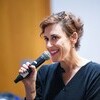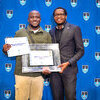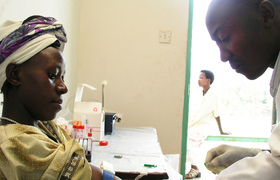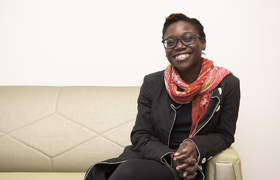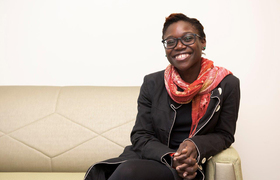‘UCT gave me the space to make a difference’
22 June 2018 | Story Ambre Nicolson. Photo Michael Hammond. Read time 7 min.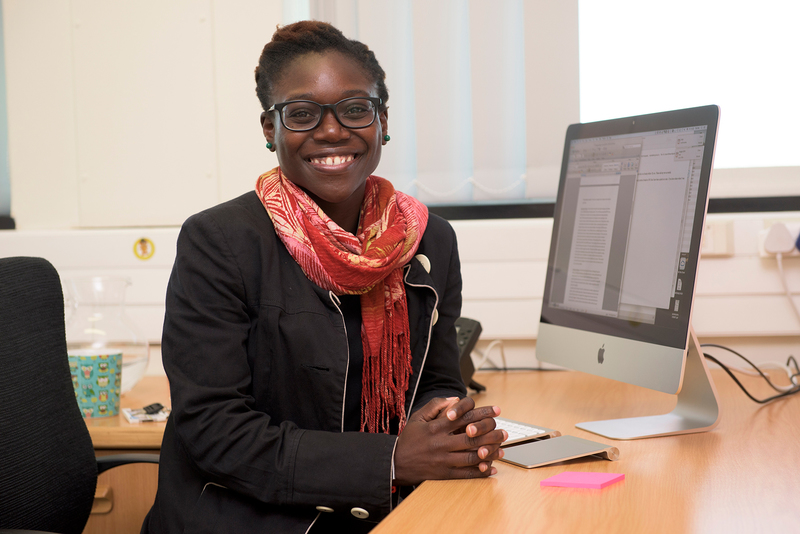
After 11 years at the University of Cape Town (UCT), Associate Professor Tolullah Oni is heading to Cambridge University to take up a research position. But she’ll never forget her time at UCT where a chance meeting changed the course of her career, and where she found the necessary support to fulfil her ambition of building a pan-African urban health research programme.
When Oni moved to Cape Town in 2006 to conduct HIV research in Khayelitsha, she had already completed her medical degree at University College London, done a stint at an Australian bush clinic, and travelled to French Guiana to conduct research.
Her journey to become a doctor started many years before all that, however, when she was a child growing up in Lagos, Nigeria. And she says her decision to come to Cape Town was actually something of a homecoming.
“My earlier experiences made me want to return in some way to where I had come from,” she recalls. “I knew I wanted to research an infectious disease that had global relevance.”
It was thanks to a chance meeting that Oni joined UCT’s Institute of Infectious Disease and Molecular Medicine (IDM) in 2007. Under the tutelage of Professor Robert Wilkinson, this would be her professional home for the following seven years.
A fateful meeting
“I had just arrived in South Africa, where I was to work for 12 months on a TB research project at what was then known as GF Jooste Hospital in Manenberg,” Oni says.
She was spending her time attending ward rounds as an observer while she awaited her Health Professions Council of South Africa (HPCSA) registration. Professor Robert Wilkinson was leading the ward round on a day Oni coincidentally needed a lift.
“I was informed that Robert was headed into town. I introduced myself to him in order to request a lift, and within the space of the 30-minute drive, he had interrogated me on my current and future career ambitions, informed me that he was advertising for a research medical officer position that I should apply for, and encouraged me to register for an MPH [Master of Public Health] at UCT and for a doctorate at Imperial College [London]. I got home that day and realised my five-year plan had been mapped out!”
“I got home that day and realised my five-year plan had been mapped out!”
Oni ended up pursuing her MPH and research doctorate simultaneously. Through this experience, she also fine-tuned her academic focus: examining the ways in which social conditions and chronic non-communicable diseases impact outcomes for infectious diseases such as tuberculosis and HIV.
She began asking the following questions: What role do things such as rapid urbanisation, obesity and diet play? Are we trying to treat one disease, or improve overall health? And most importantly, how can we create pragmatic integrated public health interventions?
Oni has focused on these interactions ever since. She played a leading role in starting a research group that investigates topics such as housing and health, and the role of rapid urbanisation for outcomes of chronic health conditions. In 2011 she also applied for the registrar programme at UCT.
“It was the best decision I could have made, because it was a super-immersive experience in the Department of Health, and it taught me so much about how to effect real change,” she says.
Creating a space to make a difference
“Rob’s mentoring – a balance between constantly looking for opportunities to put me out there, and a hands-off approach to allow me to figure things out and grow – suited me,” explains Oni.
When she decided to switch to researching the overlap between infectious and non-communicable diseases, he was supportive. Likewise, when she realised she wanted to further pivot her research into public health, and specifically urban health. He facilitated a meeting with then-department head Professor Mohamed Jeebhay and Professor Valerie Mizrahi.
“This meeting resulted in my applying for a senior lecturer position at the School of Public Health and Family Medicine [SOPHFM] in 2014,” says Oni.
She has spent the last few years at the SOPHFM, where she was promoted to associate professor in 2016. According to Oni, she has felt incredibly supported at the SOPHFM – first when she wanted redesign the fourth-year curriculum and run a curriculum jam, then later when she sought to set up a research group in urban health rather than join an existing group.
“While my application for a UCT interdisciplinary research institute in urban health was unsuccessful, the department-wide support I received from Mohamed and from Professor Leslie London in putting the application together really underscored their strong backing, without which the application would not have been possible.
“I am forever indebted to these mentors, who unblinkingly supported my (sometimes) crazy ideas, and to all the colleagues along the way who have taught me the true meaning of teamwork. I have enjoyed the fact that despite all the population health challenges that need to be addressed, my experience at UCT has been that if one is ambitious, positive and solution-driven, one can create a space to make a difference.”
“If one is ambitious, positive and solution-driven, one can create a space to make a difference.”
During her time at UCT Oni has been the recipient of numerous awards, including the Carnegie Next Generation of African Academics award, the Claude Leon Merit Award, and the UCT College of Fellows Young Researcher Award. She was also recognised as a Next Einstein Forum Fellow.
“As I prepare for my new research role at Cambridge University, my research focus remains the same as my ambition: to build a pan-African urban health research programme,” she says. “That should keep me busy for the next few years. The future, beyond that? Who knows?”
 This work is licensed under a Creative Commons Attribution-NoDerivatives 4.0 International License.
This work is licensed under a Creative Commons Attribution-NoDerivatives 4.0 International License.
Please view the republishing articles page for more information.



